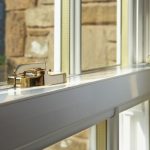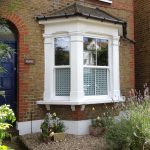What is the Difference Between uPVC and PVC Windows?
Homeowners looking to update their windows in the modern age are faced with a myriad of choices, from framing materials, glass types, glazing, hardware and finishes. With so many different options available in today’s market, homeowners have been given the perfect opportunity to create windows that truly reflect their personal tastes. However, this process can be daunting. Picking everything, from the very material the window frame is made from all the way through to the style of the glass, can be overwhelming. It can feel truly difficult to make a choice that is perfect for your home!
Here at Alaskan Windows & Doors, we understand how important it is to be fully informed before making home improvement decisions. We do our best to cut through the terminology, and offer honest and thoughtful home improvement advice to our customers. With a saturated market full of all sorts of choices, it can be hard to know which style of home improvement is best- and we want to make this process a little less stressful for homeowners. Let’s go over some information to help you pick out the best window for your property, by answering a common question – what’s the difference between uPVC and PVC windows?
What is the Difference Between uPVC and PVC Windows?
uPVC (unplasticised polyvinyl chloride) is a rigid form of PVC which is completely impermeable to water. This makes it a perfect material for window frames and doors as it is strong, hardwearing and energy-efficient. PVC (polyvinyl chloride) on the other hand, is soft and flexible and usually used for pipes, cables, roofing membranes and other items that require flexibility.
This distinction can be pretty important when it comes to designing your windows. uPVC may be a more useful pick, as it is rigid, strong and weatherproof- having a few notable advantages over PVC. While PVC is a very useful material with a myriad of applications, it is more flexible and soft than uPVC, meaning it is slightly less useful for window framing purposes.
So, What Is PVC Used For?
PVC (polyvinyl chloride) is a versatile plastic material commonly used in the construction industry for plumbing pipes, window frames, doors and siding, as well as in automotive and consumer goods. It is highly durable, waterproof and fire-resistant, making it an ideal material for many applications. PVC is also used to make medical devices and equipment, and is commonly found in the wiring and electronic components of homes, businesses and other commercial spaces.
PVC is sometimes used in older windows, especially when the window frames need to be replaced. PVC is inexpensive and easy to install, so it’s a popular material for older windows. This means that if the windows in your property appear to be deteriorating, it could be worth revamping your home with a set of uPVC windows. While PVC has definite advantages for use in construction, uPVC is thought to be the optimal choice for modern window frames.
Why Should I Pick uPVC?
uPVC is a stronger, more robust material which is perfect for window construction. It is more durable and resistant to corrosion, moisture and heat than PVC- meaning it can withstand a lot of different conditions. In this same vein, uPVC is notably waterproof and fire retardant, meaning it’s perfect for exterior applications where safety should be a priority.
uPVC is tougher and more durable than PVC, which offers significant resistance against impacts, making it suitable for use in a number of different industries. This toughness makes it perfect to enhance the level of security in your home. If you’re worried about intruders, the strength of uPVC framing can definitely help- it’s suitably tough and resistant to break-in efforts. This is a certain advantage over PVC, which is more malleable in comparison. Where safety is a priority, uPVC is a wise choice to make for your windows.
Also, it’s important to note that uPVC has better insulation properties than PVC- which is of utmost importance in the modern age. As times change and heating bills skyrocket, it’s more important than ever that our homes are energy efficient. If you’re looking to reduce heat loss through your windows and keep your home at a comfortable temperature, uPVC is a perfect material to use for the construction of your windows. As these frames prevent heat transfer from inside your home, this locks heat into your property for longer, allowing it to circulate. This prevents heat loss, keeping your home warmer for less.
uPVC is also an incredible choice if you want a material that’s available in a myriad of designs and colours. With its resistance to moisture and fading caused by UV radiation, the colours used in your windows are guaranteed to stay bright for a very long time. uPVC is also incredibly low maintenance- only requiring a wipe down with a moist cloth to keep looking its best. This means that uPVC offers a certain number of advantages over PVC, wood and metal- with less maintenance required and tons of available options for your new windows.
How Do I Choose uPVC For My Windows?
A lot of modern manufacturers use uPVC for window construction. These windows are normally advertised as “uPVC windows”, or a “composite” mix of materials. Composite mixes often use uPVC as the framing material, to create a durable and weather-resistant frame. However, it’s worth asking your installer if you’re unsure- better to ask than to assume!
Here at Alaskan Windows & Doors, we also offer a stunning range of uPVC windows to choose from. Available in a number of design choices and stunning colours, we can help you to give your London property a worthwhile upgrade. If you’re looking for a fresh set of windows in London and the surrounding areas, contact us today. We would love to help!





